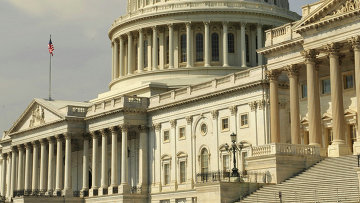WASHINGTON, August 2 - RAPSI. The U.S. House of Representatives does not have enough time to consider the bills to withdraw the Jackson-Vanik amendment and to adopt the Magnitsky list before the presidential and congressional elections in November, said Ways and Means Committee Ranking Member Sander Levin (D-MI).
Congress sources told RIA Novosti in July that the House would not be able to consider the bills prior to the recess starting in August. Speaker John Boehner (R-OH) had to admit the same last week.
In Levin's opinion, the Republicans have just postponed the issue until the post-election period. He has confirmed that the reason for the delay is the Republicans' failure to secure a sufficient number of supporters to combine both bills.
According to estimates, the withdrawal of the Jackson-Vanik amendment will allow the United States to double its exports to Russia by up to $19 billion within the next five years. The relevant bill was submitted by the committee head Dave Camp (R-MI) and Levin.
Under the new act, the special envoy for trade will make an annual report to the committee on Russia's observation of its obligations as a WTO member. If the committee finds that Russia was unable to meet any of them, the envoy will put forward his proposals for solving issues.
Many representatives and senators are determined to use the need for the cancelling of trade restrictions so as to ensure a swift adoption of visa and financial sanctions against the Russian nationals who are believed to be involved in the death of Sergei Magnitsky, an auditor for Hermitage Capital Management investment fund, who passed away while being held in jail in 2009.
They have stated that they would support granting Russia a normal trade regulations only in combination with the Magnitsky act.
The Jackson-Vanik amendment was adopted by Congress in 1974 and imposed restrictions on trade with the Soviet Union. The amendment was a response to the lack of the freedom to emigrate in the Soviet Union. At moment, the amendment is still formally valid, however, since 1989, the United States has annually placed a moratorium on it and the current administration has repeatedly promised to secure its official withdrawal.
The presidential and congressional elections will both be held on November 6.



